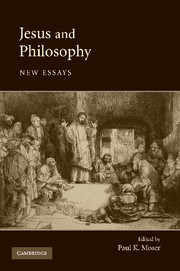Book contents
- Frontmatter
- Contents
- Preface
- Contributors
- Introduction: Jesus and Philosophy
- PART ONE JESUS IN HIS FIRST-CENTURY THOUGHT CONTEXT
- PART TWO JESUS IN MEDIEVAL PHILOSOPHY
- PART THREE JESUS IN CONTEMPORARY PHILOSOPHY
- 7 The Epistemology of Jesus: An Initial Investigation
- 8 Paul Ricoeur: A Biblical Philosopher on Jesus
- 9 Jesus and Forgiveness
- 10 Jesus Christ and the Meaning of Life
- Index
- References
7 - The Epistemology of Jesus: An Initial Investigation
Published online by Cambridge University Press: 05 June 2012
- Frontmatter
- Contents
- Preface
- Contributors
- Introduction: Jesus and Philosophy
- PART ONE JESUS IN HIS FIRST-CENTURY THOUGHT CONTEXT
- PART TWO JESUS IN MEDIEVAL PHILOSOPHY
- PART THREE JESUS IN CONTEMPORARY PHILOSOPHY
- 7 The Epistemology of Jesus: An Initial Investigation
- 8 Paul Ricoeur: A Biblical Philosopher on Jesus
- 9 Jesus and Forgiveness
- 10 Jesus Christ and the Meaning of Life
- Index
- References
Summary
We do not naturally turn to Jesus of Nazareth when we go in search of epistemological resources. On the one hand, he is seen canonically in the church in such exalted theological categories that we naturally feel it is demeaning if not insulting to pull him down to the level of our mundane puzzles about the nature of rationality, truth, warrant, justification, and knowledge. On the other hand, our ruminations on epistemic issues have a proper life of their own, with their own carefully developed themes and insights, so that dragging in Jesus of Nazareth initially seems incongruous and artificial. To speak of the epistemology of Jesus is an oxymoron, a category mistake.
No doubt there are additional historical considerations from the Enlightenment onward that confirm and strengthen our discomfort. To appeal to Jesus is simply question-begging if we are looking for a serious account of our central epistemological concepts. Why should we look to Jesus for epistemological insight? Have we not already cooked the books in advance if we appeal to Jesus? Have we not already deployed various epistemic intuitions and assumptions that allow us to bring Jesus into the discussion in the first place? Did not Descartes and Locke teach us once and for all that theological disputes required some kind of independent adjudication if they were to be resolved without recourse to violence? So from the side of philosophy the whole enterprise seems hopelessly doomed before it even begins.
- Type
- Chapter
- Information
- Jesus and PhilosophyNew Essays, pp. 149 - 168Publisher: Cambridge University PressPrint publication year: 2008



